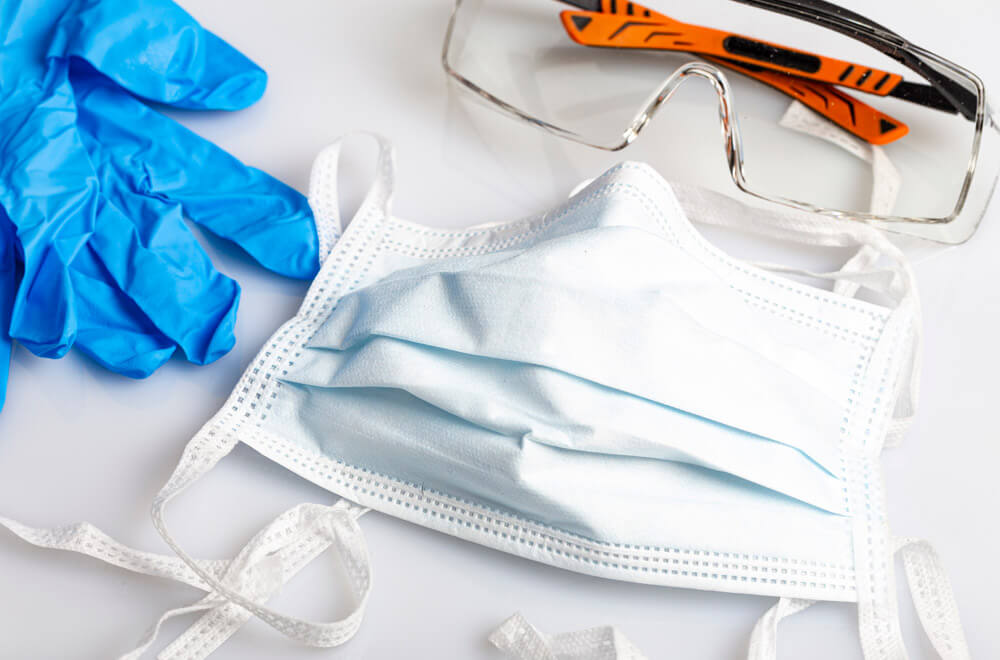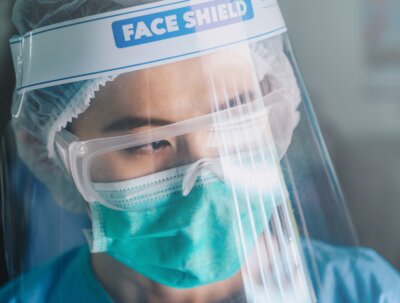What is PPE?
The term PPE covers a wide range of protective equipment that includes:
- Industrial gloves
- Eye goggles or other forms of eye protection
- Safety harnesses
- Safety helmets
- Masks or other types respiratory protection
- High visibility clothing
- Safety footwear.
- Ear protection (principally as protection from loud noise)
Some common types of personal protective equipment (PPE)
The term PPE covers a wide range of protective equipment that includes:
- Industrial gloves
- Goggles or other forms of eye protection
- Safety harnesses
- Safety helmets
- Masks or other types of respiratory protection
- High visibility clothing
- Safety footwear.
- Ear protection (principally as protection from loud noise)
What type of injuries are caused by a lack of any or any adequate PPE?
A failure to wear suitable safety helmets or harnesses can result in:
- Broken bones,
- serious head injuries
- fatal accidents
Protective gloves and footwear are used to protect against:
- cuts and lacerations
- splashes from corrosive materials and chemicals
- risk of electrocution
- burns
- injuries due to slips, trips and falls.
If protective eyewear is not used, there is a risk of eye damage from flying debris as a result of: working with machinery, drilling or cutting.
Eye protection also guards against the risk posed by the extremely bright light and heat generated by welding equipment or in a blast furnace.
Properly fitted goggles protect against injuries caused by chemical splashes or exposure to excessive dust.
Asbestos disease solicitors are only too aware of the dangers caused by a failure to provide face masks or any form of respiratory protective equipment.
The fact that more than 5000 people a year are still dying in the UK from mesothelioma, asbestos lung cancer and other forms of asbestos disease, is due to those who worked with asbestos long ago not being provided with masks or indeed any form of PPE equipment. Every day, new cases of asbestos disease claims are being started by solicitors on behalf of clients who were exposed to asbestos as many as 60 years ago.
Whilst most asbestos was banned from use as long as 35 years ago, other respiratory industrial diseases are still being caused as a result of inadequate PPE, including:
- Occupational asthma
- Occupational dermatitis
Failure to provide adequate ear protectors can lead to Noise Induced Hearing Loss (NIHL), such as :
- Occupational deafness (NIHL)
- Tinnitus
- Acoustic trauma
Does an employer have to provide PPE to his employees?
There is an Act of Parliament that governs the use of PPE. The Personal Protective Equipment at Work Regulations 1992, (PPEWR) make it clear that:
- employers must ensure that PPE is provided to employees who maybe exposed to a risk to their health or safety while at work,
- except where the employer has carried out a risk assessment and found an alternative means of protecting the employees from any risk of harm.
In effect, the requirement to provide PPE is a last resort after exhausting all other possibilities for keeping employees safe. In many cases, there will be no other suitable means of keeping employees safe other than by equipping them with PPE.
Where PPE is required, the employer must provide suitable equipment, free of charge.
On the 6th of April 2022 the Personal Protective Equipment (PPE) at Work (Amendment) Regulations 2022, came into force. As a result of the amended rules, the requirement for employers to provide employees who may become exposed to a risk with suitable PPE, is now extended to cover all workers – not just employees.
The new rules mean that casual workers and gig economy workers must be treated by employers in the same way as employees, and self-employed contractors, are.
Is an Employer under a duty to provide a certain standard of PPE?
Yes. The PPEWR refers to this and specifies that where PPE must be provided for employees, in order for it to be suitable, it has to be:
- Appropriate for the risk involved and the conditions at the place where exposure to the risk may occur.
- Takes account of efficiency and comfort requirements and the state of health of the person or persons who may wear it.
- Is capable of fitting the wearer correctly.
- Is effective to prevent or adequately control the risk without increasing overall risk.
- Complies with any existing laws on design or manufacture with respect to health and safety.
- Before the equipment is provided to an employee it must be assessed for its suitability, it must be regularly maintained and replaced where necessary.
- Employees who need to use PPE must receive proper training as to the use and correct fitting of the PPE.
- If employees are required to wear multiple types of PPE e.g. eye protection and respiratory protection, it is the employer’s duty to ensure that the different types of safety equipment are compatible with each other.
What if I am supplied with inadequate PPE?
Your employer owes you as their employee, a duty of care. This means that they must look after you whilst you are at work and see that no harm comes to you.
That is known as a common law duty.
However, the PPEWR Act also imposes certain specific rules that relate to ensuring that any PPE that’s provided is suitable – in other words, that it is fit for purpose.
If your employer provides you with inadequate PPE and you suffer a workplace injury or an industrial disease as a result, then you may be able to file an accident at work claim for compensation.
You will probably need to prove that your employer was negligent even if you rely on one of the breaches of the PPEWR. Did your employer do all that they could to protect you against a reasonably foreseeable risk? If not, then it is highly probable that they were negligent.
What do I need to prove to be able to make an inadequate personal protective equipment claim?
You need to be able to prove:
- That the employer owes you a duty of care to you
- That your employer has breached that duty of care
- That the injury or disease that you are claiming for was caused by your employer’s breach of duty
Your employer owes you a general duty of care and where they are obliged to provide you with Personal Protective Equipment, by virtue of the PPE regulations, they have a ‘statutory duty’ of care i.e. an obligation imposed by written laws. If your employer has been in breach of that duty by supplying you with inadequate PPE and you have been injured or you get an industrial disease as a result of that, you will have a reasonable case for making a successful claim for compensation.
What can I claim for when making an inadequate PPE claim?
Your claim will be for:
General Damages – compensation for the injury or disease itself and for how it affects your life whilst you suffer from the effects of it. You will hear this referred to as damages (compensation) for ‘pain, suffering and loss of amenity.’
Special Damages – monetary losses. Loss of earnings is often the main heading of special damages.
Other items of special damages can include:-
- Medical expenses
- Travel costs
- Prescription charges
- Costs of physiotherapy or other types of rehabilitation
Depending on how serious your injury or disease is and the ongoing effects it has on your quality of life, there may be other costs and expenses that are specific to your case that can be claimed for. If you call Mooneerams on 029 2048 3615, one of our experienced solicitors will be pleased to discuss with you any queries you may have, entirely free of charge.
How long have I got to make a PPE compensation claim?
In the case of most PPE compensation claims you will have 3 years from the date of the incident that caused you to suffer injury or disease in which to make a claim. Some respiratory diseases can take time to show symptoms. In those instances, the 3-year period will not start until you know or ought to have known that the disease or illness you have started to suffer from was caused by being provided with inadequate PPE. In the majority of cases this date will be the date that you get a diagnosis from a doctor.
How do I claim compensation for inadequate PPE?
It’s important whenever you are making a claim for personal injury compensation that you do so by using the services of a specialist personal injury solicitor. The solicitor that you choose also needs to have plenty of experience of dealing with accident at work claims. PPE claims can sometimes be complicated. However, by using the services of a suitably experienced employers liability claim solicitor, you will have the best chance of recovering the maximum amount of compensation possible.
If you decide to use the services of Mooneerams Solicitors, you will be putting your claim in the hands of a firm of expert personal injury solicitors. We only deal with personal injury claims.
We are based in Cardiff and have office facilities in Aberdare, Bridgend, Caerphilly, Swansea, Cardiff Bay, Caerphilly and Pontypridd. Our reputation is such that clients come to us from all over Wales and England.
No Win Ne Fee Inadequate PPE claims
When you first call us on 029 2048 3615, we’ll discuss the funding of your claim. In very many cases, we’ll be able to pursue this type of claim for you by offering you the benefit of a No Win No Fee agreement (or to be more accurate, a Conditional Fee Agreement). Briefly – if you pursue a claim with the benefit of a No Win No Fee agreement in most cases, should your claim not be successful you’ll have nothing to pay.
You’ll find more helpful and detailed information in our No Win No Fee Advice Guide.
Call us now for free initial advice if you think you might have a potential claim for injury or disease caused by the use of inadequate PPE. Call 029 2048 3615. Your call to us is entirely confidential and there is no obligation on you to take your claim any further with us after the call.
If you’d prefer us to call you, please leave your details in the form on the right-hand side of this page.






















